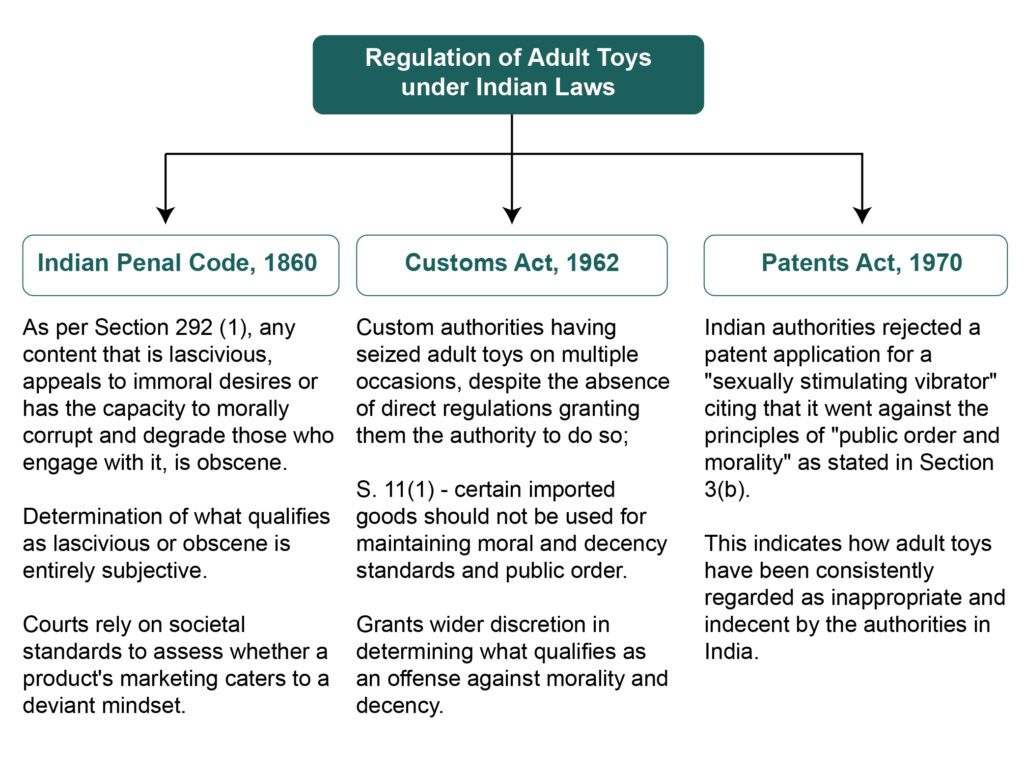Blog Content Overview
AI Summary
The sex toy market in India is rapidly evolving, with a valuation of approximately USD 112.45 million in 2024, projected to reach around USD 264 million by 2030 due to changing societal attitudes, increased disposable income, and online shopping. However, the legal landscape remains ambiguous, with no explicit laws regulating adult toys, leading to confusion under obscenity laws. The judiciary has begun to reflect shifting perspectives on sexual wellness, recently ruling that sex toys aren't inherently obscene if marketed appropriately. Key challenges for businesses include obscenity classification, importation issues, and misleading marketing practices. As the market grows, there is a pressing need for clear regulations and ethical marketing strategies to foster a stable environment for adult toy sales in India.
Introduction to Indian Market Growth and Trends
Despite the social taboos associated with the purchase and use of adult toys in India, market research indicates rapid growth in the category, driven largely by online marketplaces and changing consumer attitudes toward sexual wellness products. According to industry reports, India’s sex toys market was valued at around USD 112.45 million in 2024 and is projected to expand at a compound annual growth rate (CAGR) of roughly 15–16% through 2030, potentially reaching about USD 264 million by the end of the decade.
With the global sex toys market expected to grow to approximately USD 45–49 billion by 2026, India’s market continues to show strong momentum as one of the fastest growing regional segments in personal intimacy and wellness products. This growth trajectory reflects rising digital penetration, urban consumer acceptance, and increased accessibility through e-commerce platforms. However, the legal landscape surrounding the manufacture, import, marketing, and sale of adult toys in India remains ambiguous and challenging. While there is no specific statutory prohibition on sex toys, provisions related to obscenity in the Indian Penal Code are often invoked in enforcement and interpretation creating uncertainty for businesses in the sector.
This overview highlights key developments signifying an evolving legal and social understanding of the sex toy business in India. It aims to navigate the complex regulatory environment, offering insights into the challenges and solutions for adult toy sellers attempting to capitalise on this rapidly growing market.
The adult toys market in India is experiencing a period of significant growth, fueled by a number of social and economic trends.
- Shifting Attitudes: Social media and increased openness about sex are leading to a normalization of adult toys, particularly among younger generations. This is chipping away at traditional stigmas.
- E-commerce Boom: The rise of shopping platforms to purchase sex toys online in India provides a discreet and convenient way for people to purchase adult toys, bypassing potential embarrassment in physical stores.
- Increasing Disposable Income: A growing middle class with more spending power creates a larger market for these products.
- Focus on Sexual Wellness: Adult toys are increasingly seen as tools for enhancing sexual pleasure and intimacy, not just taboo items.
- Dominant Products and Users: Vibrators currently hold the largest market share, but rings and other male-oriented products are showing promising growth. Women are the primary users, but the male segment is catching up.
- Distribution Channels: Purchasing sex toys online in India is the preferred method of purchase, accounting for over 59% of the market. Discreet packaging and secure transactions are key factors. Key players include Besharam, Snapdeal, LoveTreats, and ThatsPersonal.
Legal Framework for Sex Toys in India
While there is no express legislation banning the manufacture/import and sale of adult toys in India, the applicable regulatory framework relies primarily on obscenity laws, followed by laws which generally regulate the quality of goods and protect consumer interests. In India, the topic of sex doll laws order is characterized by a lack of clear legal guidelines, resulting in an ambiguous status for these products. The fundamental challenge under this framework is that these legislations contain language that is sufficiently vague enough that authorities are left to exercise their own discretion in its interpretation, often leading to an adverse outcome:
- Indian Penal Code, 1860 (“IPC”):
Section 292(1) of the IPC deems an object to be ‘obscene’ if “it is lascivious or appeals to the prurient interest” or if its effect is “such as to tend to deprave and corrupt a person”. In essence, an object is considered obscene if it’s seen as offensive or appeals to sexual desires in a way that could harm people’s morals. This includes selling, distributing, or advertising these objects. The sale, distribution, import, conveyance, profit from and advertisement of “obscene objects” is also punishable by fine and imprisonment, upon conviction under Section 292(2) of the IPC.
Given the inherent subjectivity in determining whether content is “obscene”, Indian courts have adopted a ‘Community Standard Test’ to determine whether a product and its marketing caters to such a deviant mindset. The problem is that what’s “obscene” can be a matter of opinion. Indian courts consider what most people in India would think, not just a small group of susceptible or sensitive people. Consequently what’s considered obscene can change over time. However, many people in India still see sex and obscenity as the same thing; this continues to present a challenge in determining an objective standard of obscenity. - Indecent Representation of Women (Prohibition) Act, 1986 (“IRW”):
The IRW explicitly defines “indecent representation of women” to mean a “depiction in any manner of the figure of a woman, her form or body or any part thereof in such a way as to have the effect of being indecent, or derogatory to, or denigrating women, or is likely to deprave, corrupt or injure the public morality or morals”, with the promotion of such representation (through books, pamphlets, etc.) being punishable under Section 4 of IRW with imprisonment and fine (including upon a company and its directors/key managerial personnel). The problem is, what’s “indecent” can be a matter of opinion. The law also says this kind of content can’t harm public morals and consequently impacts the manner in which sex toys – especially how sex toys in India are marketed to the consumer base. - Information Technology Act, 2000 (“IT Act”) and Information Technology (Intermediary Guidelines and Digital Media Ethics Code) Rules, 2021 (“ IT Rules”):
Section 67 of the IT Act expressly prohibits the publication or transmission of “lascivious or prurient material” (defined as material that is sexually explicit or arousing in nature) in electronic form. The responsibility to prevent such publication or transmission is further imposed specifically on intermediaries (i.e., online platforms listing adult toys in India, in the present case) in the IT Rules, where intermediaries are required to not only prevent obscene materials from being hosted on their platform, but requires implementation of effective content removal mechanisms. - Customs Act, 1962 (“CA”):
Section 11 of the CA empowers the government to prohibit the import or export of certain goods for the purpose of “maintenance of public order and standards of decency or morality”, with the competent officer further empowered to seize such goods that may be liable for confiscation under the CA. Further, customs officers typically rely on a 60 years old Notification as of 2024 (the “Customs Notification”), whereunder the import of any “obscene book, pamphlet, paper, drawing, painting, representation, figure or article” was prohibited.
Given existing social taboos around the discussion of sex – adult toys purchased overseas by Indian consumers are often seized by customs officials, under the grounds that such products are “obscene” and violative of the “standards of decency or morality”. Adult toys also do not fall in a class of products by themselves (and do not have an explicit Harmonized System of Nomenclature classification), leading to these products being marketed as “massagers” and such other nomenclature that does not expressly identify that the product is marketed for private enjoyment. - Patents Act, 1970 (“PA”):
Section 3(b) of PA empowers the government to reject applications for patents on the grounds that the product sought to be patented went against the principles of public order and morality. The provision has even been invoked to reject a plea by a Canadian company seeking to patent a vibrator in India, stating “the law has never engaged positively with the notion of sexual pleasure”. - Consumer Protection (E-Commerce) Rules, 2020 (“E-Commerce Rules”) read with the Consumer Protection Act, 2019 and the IT Act:
The E-Commerce Rules were enacted to protect consumer interests in the rapidly burgeoning e-commerce marketplace in India. To this effect, the E-Commerce Rules place an onus on online platforms to ensure sellers offer precise and truthful product information. This creates an added burden on sellers of sex toys online in India and online platforms listing such adult toys, in order to prevent misrepresentation and requiring accurate labelling and imagery to distinguish between adult toys and other items, directly influencing the sale and marketing of such products in India.

The Evolving Legal Position for Sex Toys in India
The alleged illegality of adult toys in India has been a subject of judicial study on numerous occasions, with intermediaries like Snapdeal.com and Ohmysecret.com being taken to court for sale of “obscene” products on their website even as recently as 2015. However, the notion that the “State has no place in the bedrooms of the nation” is one that is increasingly reflected in judicial precedents surrounding, inter alia, the legality of sex toys in India.
Critics of the ambiguous legal position regulating the sex toy market in India have relied on the Supreme Court’s landmark rulings in the cases of: (i) Justice K S Puttaswamy (Retd.) v Union of India, where the apex court categorically held that “privacy includes at its core the preservation of personal intimacies, the sanctity of family life, marriage, procreation, the home and sexual orientation.”; and (ii) Navtej Singh Johar & Ors. v Union of India, where it was held that “human sexuality cannot be limited to its role solely in procreation” and that the Constitution “safeguards the diverse and changing nature of sexual experiences”.
The High Court of Calcutta, while hearing a case where sex toys purchased by a woman were confiscated by the Customs Authority of Calcutta, held that “Regard being had to the prevailing social mores and standards of morals in our country the goods and items do not reflect anything obscene. Merely because the rules of some of the games may have an erotic and aphrodisiac content or may have a titillating effect for arousing sexual desires, these items, without anything more, cannot be labelled as obscene. The rules of the game have not employed any offensive language. In our opinion, an article or instruction suggesting various modes for stimulating the enjoyment of sex, if not expressed in any lurid or filthy language, cannot be branded as obscene. If that not be so, books like Kama Sutra should also be banned on the charge of obscenity as this ancient Sanskrit treatise on the art of love and sexual techniques also candidly contains various instructions for heightening the pleasures of sexual enjoyment.” The High Court emphasizes that sex toys cannot be classified as “obscene” just because they give sexual pleasure is a welcome assertion and the Honourable Court’s rationale rings particularly true in face of the exemptions contained in the legislations outline earlier in this manual, where “obscene” content produced is not violative of the IPC or IRW, where it is justifiable as being for the public good by contributing to art or culture.
As part of the evolving judicial trends, companies seeking to enter the sex toys market in India can feel bolstered by the March 2024 ruling of the High Court of Bombay in Commissioner of Customs NS-V v DOC Brown Industries LLP. The case in question revolved around an appeal by the company, challenging a confiscation order from the Commissioner of Customs. This order had seized a shipment of body massagers, labeling them as “adult sex toys” which were “prohibited for import” and that the applicant company had mis-declared the description of the goods (relying upon Section 292 of the IPC and the Customs Notification). The Commissioner further relied upon testimony from medical experts who opined that while the products were in fact body massagers, they could be used for sexual pleasure.
In quashing the impugned order of the Commissioner, the High Court held that:
- Body massagers cannot be legally equated with items explicitly banned under Customs Notifications, which traditionally cover materials like books and pamphlets. This differentiation highlighted a misinterpretation of the law by the customs authority.
- It was determined that the classification of these massagers as prohibited items stemmed from the subjective viewpoint of the Commissioner, rather than any solid legal basis. The judgement clarified that customs notifications do not categorise body massagers as obscene or contraband.
- Significantly, the court pointed out that since body massagers are legally sold within India, it contradicts logic to ban their import. This acknowledgment serves as a reminder of the need for consistency in regulatory approaches.
- Lastly, the court refuted the argument that the potential for an alternative sexual use of these massagers could justify their prohibition. It stressed that such a criterion is not valid for deeming goods as banned, provided they meet the standard requirements for import and sale.
Challenges and Solutions around Legality of Sex Toys in India
The market for adult toys, particularly for sex toys online in India, is booming, but the legal landscape is still a bit cloudy. Wherever the discussions around topics like sex doll laws order or legality of sex toys in India occur, the law regulations appear hazy. Here’s a breakdown of the challenges companies face and some creative solutions they’re using:
Challenges:
- Obscenity Laws: The primary challenge lies in the ambiguity surrounding the classification of sex toys under Section 292 of the IPC and the Customs Act, 1962. The subjective nature of “obscenity” creates uncertainty for businesses, as customs officials may confiscate adult toys in India deemed obscene at their discretion.
- Misleading Marketing: To circumvent legal complexities, companies often resort to marketing adult toys under alternative names like “massagers.” While this allows them to operate, it raises concerns about consumer protection laws. Misrepresenting a product’s purpose could be misleading and lead to subsequent actions.
- Importation Issues: The absence of specific Harmonized System of Nomenclature (HSN) codes for adult toys creates difficulties in importation procedures. Classification as “obscene” can lead to confiscation by customs authorities. Additionally, misclassifying adult toys can result in penalties for importers.
- Medical Device Registration: While some adult toys with therapeutic applications may be registered as medical devices under the Medical Devices Rules, 2017, most pleasure-oriented sex toys lack inherent therapeutic value. Obtaining medical device approval based solely on disclosure, without a genuine therapeutic application, raises concerns about the integrity of the system.
Solutions:
- Judicial Clarity: A definitive ruling by the Supreme Court on the legality of sex toy business in India would provide much-needed clarity for the industry. This would eliminate the subjective interpretation of obscenity laws and provide a clear framework for businesses to operate within.
- Legislative Reform: Enacting specific legislation regulating adult toys would address current ambiguities. This could involve creating a separate category for adult toys within the HSN code and establishing clear guidelines for their marketing and sale; or creating legislation specifically addressing the legality of the sex toy business in India.
- Ethical Marketing: Companies can navigate the current environment by adopting ethical marketing practices. Utilizing neutral product descriptions and focusing on potential wellness benefits associated with certain adult toys can help avoid legal issues related to obscenity.
- Transparent Disclosures: When registering adult toys in India for medical device approval, companies should ensure transparency in disclosures. This ensures the integrity of the system and avoids misuse of the medical device classification for products lacking a genuine therapeutic purpose.
Read our Previous Report on Are Sex Toys Legal in India?
Conclusion
The adult toys market in India exhibits tremendous potential. However, the legal ambiguity surrounding these products necessitates creative strategies and cautious navigation by companies. In India, adult toys that are not presented or advertised in an indecent manner are generally considered legally acceptable. However, if these products have packaging or marketing materials that are deemed obscene according to Indian obscenity laws, they may be in violation of those laws. This creates confusion regarding whether or not sale of products in India can be lawfully sold in India. The legal ambiguity surrounding these products necessitates creative strategies and cautious navigation by companies. Until a definitive legal framework or a Supreme Court ruling emerges, the industry will likely rely on a combination of ethical marketing practices, judicious use of medical device registration, and a continued push for legislative reform to ensure a more stable and transparent business environment.
Frequently Asked Questions (FAQs) on Legal Status of Sex Toys in India
- Are sex toys (adult toys) legal in India?
Yes, adult toys that are not presented or advertised in an indecent or obscene manner are generally considered legally acceptable in India. - Is there a sex dolls legislation in India?
No, there is no specific law that directly governs the sale of sex dolls or other adult toys in India. This has resulted in a gap in the legal framework where the interpretation of the law is subjective and dependent on legislations that were enacted decades ago. - Can I bring sex toys to India?
Yes, there is no law that directly bans this. However, as seen in the case of Commissioner of Customs NS-V v DOC Brown Industries LLP, where the interpretation of the sex toy legislation (or lack thereof) is in itself subjective, there can be practical issues posed by customs officials at the port of entry into India. - Are sex toys banned in India?
No, there is no law that expressly bans sex toys. Conversely however, there is also no law explicitly stating that the sex toy business in India is legal. As such, sale of sex toys online in India operates in murky waters.
We Are Problem Solvers. And Take Accountability.
Related Posts

Family Offices in India – The Insider’s Guide for India’s New Wealth Class
India's wealth is no longer just stored in family businesses and fixed deposits. By 2026, over 300 family offices will...
Learn More

When ₹279 Crore Became the Price of Ignoring Your SHA – Medikabazaar
The Medikabazaar Collapse: A Governance Case Study for Every Funded Founder Every SHA signed during a fundraising round contains a...
Learn More
![Alternative Investment Funds(AIFs) in India : Framework, Types, Meaning [March 2026]](https://treelife.in/wp-content/uploads/2024/08/AIF-Alternative-Investment-Funds.webp)
Alternative Investment Funds(AIFs) in India : Framework, Types, Meaning [March 2026]
DOWNLOAD PDF Alternative Investment Funds, often abbreviated as AIFs, have become a buzzword among sophisticated investors, especially High Net Worth...
Learn More












